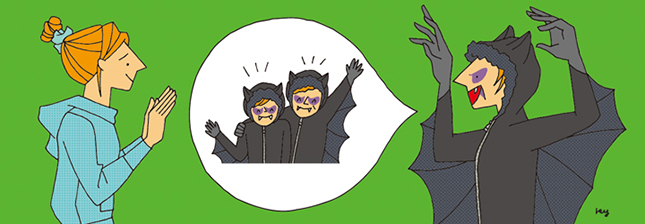会話を学ぶ「英会話講座」
2016.10.4
お菓子をくれないといたずらするぞ

<Zoeがリビングでテレビを見ていると、弟のMaxがハロウィンの仮装をしてやって来ました。>
EnglishJapanese
Max: Boo!
Zoe: Ahh! You scared the pants off me! What are you doing?
Max: I’m just trying out my new costume. What do you think?
Zoe: I think you’re just like dad. He pulls pranks like these all the time.
Max: [laughs] Maybe it runs in the family.
Zoe: Probably. So… what are you supposed to be?
Max: I’m a zombie bat monster from Mars. Pretty cool, right?
Zoe: Well, it certainly is one of a kind.
Max: You don’t like it?
Zoe: Well, at the end of the day, what’s important is that you like it.
Zoe: Ahh! You scared the pants off me! What are you doing?
Max: I’m just trying out my new costume. What do you think?
Zoe: I think you’re just like dad. He pulls pranks like these all the time.
Max: [laughs] Maybe it runs in the family.
Zoe: Probably. So… what are you supposed to be?
Max: I’m a zombie bat monster from Mars. Pretty cool, right?
Zoe: Well, it certainly is one of a kind.
Max: You don’t like it?
Zoe: Well, at the end of the day, what’s important is that you like it.
Max: わっ!
Zoe: うわー!死ぬほどびっくりしたわ!何してるのよ?
Max: 新しいコスチュームを試しに着てみているだけだよ。どうかな?
Zoe: あなたって、本当にお父さんみたいだわ。お父さんも、いつもこういういたずらするのよね。
Max: [笑いながら] 親譲りってことかもね。
Zoe: かもね。ところで… 何になるつもりなの、あなた?
Max: 火星からやって来たゾンビ・コウモリ男さ。すごくよくない?
Zoe: そうねえ、まあ個性的ってことは確かね。
Max:気にいらないの?
Zoe: まあ、大事なことはあなたが気に入ってるってことだから、結局のところ。
Zoe: うわー!死ぬほどびっくりしたわ!何してるのよ?
Max: 新しいコスチュームを試しに着てみているだけだよ。どうかな?
Zoe: あなたって、本当にお父さんみたいだわ。お父さんも、いつもこういういたずらするのよね。
Max: [笑いながら] 親譲りってことかもね。
Zoe: かもね。ところで… 何になるつもりなの、あなた?
Max: 火星からやって来たゾンビ・コウモリ男さ。すごくよくない?
Zoe: そうねえ、まあ個性的ってことは確かね。
Max:気にいらないの?
Zoe: まあ、大事なことはあなたが気に入ってるってことだから、結局のところ。
キーフレーズ
“scare the pants off (of) ~” ~をひどく怖がらせる
この表現は人を極端に怖がらせることを意味します。“the pants off of”というフレーズは程度が甚(はなは)だしいいことを強調して言う際に使います。もし“beat the pants off of~”と言えば、スポーツなどの試合で相手を「~を完璧なまでに打ち負かす」ことを意味します。
例)Francineと友人のKevinが新作映画の話をしています。
Francine: Hey Kevin, wanna go see Chills and Thrills 2? I have an extra ticket.
Kevin: No way! The first movie scared the pants off of me. I couldn’t sleep for two days!
Francine: ねえ、Kevin、Chills and Thrills 2観たくない?チケット余ってるのよ。
Kevin: 無理!一作目観て、死ぬほど怖い思いさせられたから。2日間も夜眠れなかったんだぜ!
Francine: Hey Kevin, wanna go see Chills and Thrills 2? I have an extra ticket.
Kevin: No way! The first movie scared the pants off of me. I couldn’t sleep for two days!
Francine: ねえ、Kevin、Chills and Thrills 2観たくない?チケット余ってるのよ。
Kevin: 無理!一作目観て、死ぬほど怖い思いさせられたから。2日間も夜眠れなかったんだぜ!
“run in the family” 家系特有のものである
血のつながりのある人々の間で、資質や特徴、振る舞い方などが似通っていることを言う際に使われる表現です。親と子に対して使えば、性格や容姿、行動などが「親譲り」であることを言うことができます。
例)Jessieと兄のOliverが屋根裏部屋で見つけた曽祖父母のアルバムを見ています。
Jessie: Oh wow, I had no idea our great grandpa was so handsome.
Oliver: [looks in a mirror] I guess you could say good looks run in the family.
Jessie: まあ、すごいわ。私たちのひいおじいちゃんがこんなにかっこよかったなんて知らなかったわ。
Oliver: [鏡を見ながら] 見た目がいいのはうちの家系の特徴って言えるんじゃない。
Jessie: Oh wow, I had no idea our great grandpa was so handsome.
Oliver: [looks in a mirror] I guess you could say good looks run in the family.
Jessie: まあ、すごいわ。私たちのひいおじいちゃんがこんなにかっこよかったなんて知らなかったわ。
Oliver: [鏡を見ながら] 見た目がいいのはうちの家系の特徴って言えるんじゃない。
“one of a kind” 独特である
この表現は他に似たようなものがなくユニークであることを意味します。肯定的な意味でも使いますが、文脈によっては、あまりにも独特で異様であるという意味でも使われます。
例)海外旅行をしているReginaに男が近づいてきて、陶器でできた手作りのネコの置物を売ろうとしています。
Salesman: Can I interest you in a porcelain cat? They’re all handmade by my wife.
Regina: Oh, my. They really are one of a kind. How much are they?
Salesman: 陶器のネコはいかがですか?どれも妻の手作りなんですよ。
Regina: あらまあ。すごく独特だわ。いくらですか?
Salesman: Can I interest you in a porcelain cat? They’re all handmade by my wife.
Regina: Oh, my. They really are one of a kind. How much are they?
Salesman: 陶器のネコはいかがですか?どれも妻の手作りなんですよ。
Regina: あらまあ。すごく独特だわ。いくらですか?
“at the end of the day” 結局は
このイディオムは“in the end”(ついに、結局)、“ultimately”(最終的に)、“after all”(やはり、結局)などと同じような意味で使われる表現です。もちろん文脈によっては文字通り「一日の終わりに」という意味にもなります。
例)Helenが父親のWillに部屋の掃除をしたくないと言っています。
Helen: I don’t want to clean my room. Can I do it tomorrow?
Will: Take as long as you want – at the end of the day, you’re the one living with the mess.
Helen: 部屋の掃除したくないわ。明日でもいい?
Will: 好きなだけ先延ばしにしていいよ。散らかってるところで過ごすのは、結局自分だからね。
Helen: I don’t want to clean my room. Can I do it tomorrow?
Will: Take as long as you want – at the end of the day, you’re the one living with the mess.
Helen: 部屋の掃除したくないわ。明日でもいい?
Will: 好きなだけ先延ばしにしていいよ。散らかってるところで過ごすのは、結局自分だからね。


 【Gabaからのお知らせ】
【Gabaからのお知らせ】 【特集】
【特集】 【英単語の正しい使い分け】
【英単語の正しい使い分け】 【使いこなす句動詞】
【使いこなす句動詞】